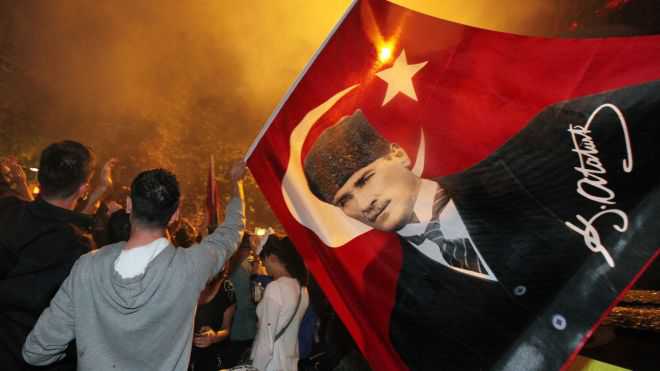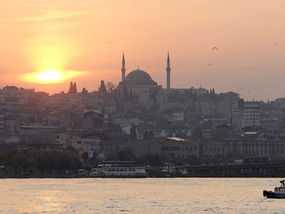29.09.08 13:15Azerbaijan, Baku, 27 September /corr. Trend News E.Tariverdiyeva / Consent of Armenia to participate in the Turkish project “Platform of security and stability in Caucasus” is a positive trend for discussions over many disputable questions in the Caucasus region. However, the opinions of political scientists do not conver the question of the solution of the Nagorno-Karabakh conflict with the help of the Turkish initiative.
“It is very important that the Armenian leadership is more opened to the Turkish role in the region and this is positive changes, which now occur,” American expert on Caucasus, Svante Cornell, told TrendNews by telephone from Stockholm.
At the meeting in New York on 26 September, the Foreign Ministers of Azerbaijan and Armenia supported Turkish initiative to establish “Platform of security and stability in Caucasus”, Foreign Minister of Turkey, Ali Babajan, told CNN Turk television.
“Negotiations in format of troika will be continued further. There is real desire of the authorities of the two states to solve the Nagorno-Karabakh problem,” said the diplomat.
In mid September, Russia and Turkey began realization of plan with regards to establishment of “Platform of security and stability in Caucasus” for five countries – Azerbaijan, Russia, Georgia, Turkey and Armenia. The aspiration of Turkey for the prompt solution of the territorial conflicts in Caucasus between Armenia and Turkey, and between Armenia and Azerbaijan was the purpose of the creation of this platform.
Observers consider that the consent of Armenia to participate in the Turkish initiative is the first step to the beginning of constructive talks on the problems in the region.
The European Commission considers that Turkey could make a contribution to the solution of the Armenian-Azerbaijani conflict.
“Turkish initiative to establish “Platform of security and stability in Caucasus” is very interesting, and it can contribute to the solution of conflicts in this region,” the Head of the Diplomatic Mission of the European Commission to Azerbaijan, Alan Waddams, told TrendNews .
The proposal of Turkey is interesting and should be considered, he said.
“I believe that with the initiative of Turkey, the OSCE Minsk Group can achieve solution of protracted conflicts,” the diplomats said.
The conflict between the two countries of South Caucasus began in 1988 due to territorial claims by Armenia against Azerbaijan. Armenia has occupied 20% of the Azerbaijani land including the Nagorno-Karabakh region and its seven surrounding Districts. Since 1992, these territories have been under the occupation of the Armenian Forces. In 1994, Azerbaijan and Armenia signed a ceasefire agreement at which time the active hostilities ended. The Co-chairs of the OSCE Minsk Group (Russia, France and USA) are currently holding peaceful negotiations.
The Azerbaijan side hopes for Turkish initiative in the solution of the Nagorno-Karabakh conflict.
“It is completely possible that after the visit of the Turkish President to Yerevan, Armenia will also participate in the establishment of peace and stability in Caucasus,” member of Azerbaijani delegation to PACE, MP Aydin Mirzazade, said.
This means the new way of Armenian policy, and in the near future, it is completely possible that we will observe changes in the policy of Armenia, he said.
“Azerbaijan, as state close to Turkey, and Armenia, which wants to establish relations with Turkey, helped Turkey and gave worthy assessment to its initiative, which is no longer pointless talk and proposal in air,” Mikhail Remizov, President of Russian Institute of National Strategy, told TrendNews.
However, the political scientist does not consider this decision of Armenia and Azerbaijan in linkage to the Karabakh conflict. “I do not here see the Karabakh theme, with exception of the fact that in the case of creating this format, this will be favorable for discussion of similar questions,” he said.
Turkish political scientist Arif Keskin does not believe in the success of platform, proposed by Turkey, in the Karabakh problem solution.
“Talks with the mediation of Turkey can at best lead to the liberation of Azerbaijani regions around Karabakh, which will make a Karabakh problem even more difficult,” representative of Eurasian Research Strategic Center (Ankara), Keskin, told Trend News by telephone.
American expert on Caucasus Cornell connects further solution of the conflict with the actions of Russia.
According to him, the conflict will not be resolved unless there are serious signals that Russia is inclined to the peace between Armenia and Azerbaijan.
“In the present situation, when Russia became stronger in the region, and the West is weaker, it would be good be see changes in the direction of the solution of conflict in Karabakh,” Cornell, Research Director of Central Asia-Caucasus Institute at Johns Hopkins University, told TrendNews by telephone.
E.Ostapenko (Baku), B.Hasanov (Baku), I.Alizade (Baku) and R.Agayev (Moscow) attended the preparation of the material.
The correspondent can be contacted at: [email protected]





